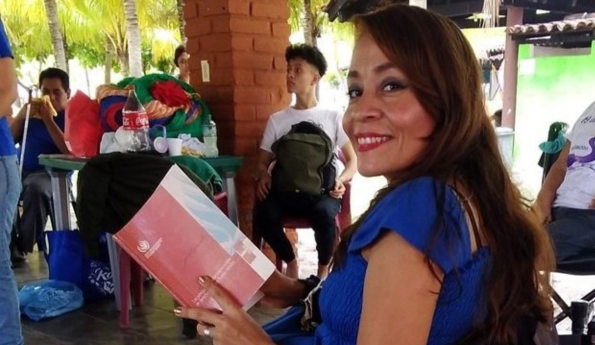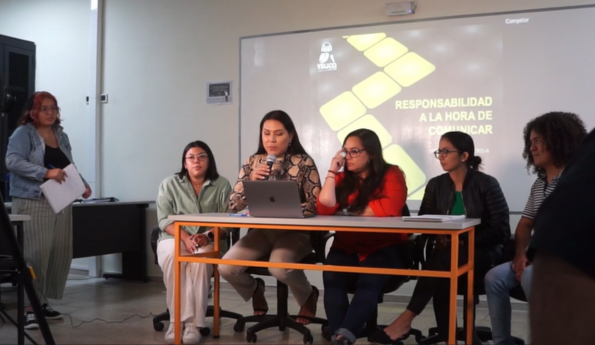By Maria Martinez, Communications Intern, and Ellie Rizzo, Global Growth Intern
The 1992 Chapultepec Peace Accords aimed to bring peace to El Salvador after a decade-long civil war. Twenty-six years after that cease-fire, El Salvador remains one of the most dangerous countries in the world outside of active war zones. Gender-based violence, gang activity, and mano dura security policies leave citizens vulnerable to extortion, gang recruitment, and violent crime. As these problems continue, the government and justice systems in El Salvador have struggled to effectively address the chronic violence.
Counterpart International, in partnership with the Inter-American Dialogue, convened expert perspectives in Washington DC on July 2nd to discuss transitional justice in El Salvador and the country’s efforts to combat crime and violence. Counterpart’s El Salvador Rights and Dignity Project (Derechos y Dignidad), funded by USAID, collaborates with civil society, the private sector, academia, and government entities to promote and protect the human rights of all Salvadorans, especially members of vulnerable groups: women, youth, people with disabilities, and the LGBTI community.
WATCH the discussion on C-SPAN.
The expert panel included Mileydi Guilarte, Counterpart’s Chief of Party for the Rights and Dignity Project; Chuck Call, Associate Professor of International Peace and Conflict Resolution at American University; and Leonor Arteaga, a Salvadoran attorney and Senior Program Officer at Due Process of Law Foundation (DPLF), an implementing partner of the Rights and Dignity Project.
Guilarte: 92% of crimes in El Salvador go unpunished. The Supreme Court ruling that the amnesty law is unconstitutional provides hope. We are supporting judges looking into these cases and working with human right groups to ensure #JusticeElSalvador is served. @The_Dialogue pic.twitter.com/frGX9auqhe
— Counterpart International (@counterpartint) July 2, 2018
The panel began by exploring the deep-rooted causes of migration from El Salvador, which date back over 35 years to the pervasive violence and impunity that existed during the civil war.
Today, “impunity is rampant in El Salvador; almost 92% of crimes go unpunished,” commented Guilarte. Such impunity spans both past and present. In 1993, El Salvador passed an Amnesty Law that protects from prosecution those responsible for war crimes and human rights violations during the civil war. In 2016, El Salvador took a promising step toward healing historical wounds when its Supreme Court declared the Amnesty Law unconstitutional. Since then, several war crimes cases have been reopened for criminal prosecution.
Acknowledging the significance of the Amnesty Law repeal, Arteaga, who works closely on some of the most emblematic historical crime cases, noted that only one case has made significant progress.
“International standards must be implemented when reviewing the high-level cases,” said Arteaga. “Our hope is that reopening these cases will be a small yet important step in improving the judiciary system in El Salvador.”
This type of transitional justice, addressing historical impunity, will aid in holding the government and individual citizens accountable for fostering a peaceful environment.

For the transitional justice process to be successful, Arteaga also emphasized the need for strong leadership, with specialized and robust knowledge of national and international standards. This is a critical year, with both the attorney general and five Supreme Court justice seats up for election. Civil society’s proactive engagement in these elections and in the judicial proceedings is essential. Counterpart is actively working to support these efforts, training government officials in the justice sector, including the national civilian police, the Attorney General’s office, and forensic investigators, on international human rights standards.
Guilarte went on to argue that open dialogue between civil society, police, and government is key to de-polarizing a country like El Salvador.
“The past and the present … it’s needing to make an investment on the case and from the victim’s perspectives,” said Guilarte. “Women and youth, who comprise over 50 percent of the population, have been directly affected by the gangs. How can we listen more to these populations?”
To solve the problem of violence, lawmakers and authorities need to ask those at risk for their ideas for community-based solutions. Policymakers are looking for anti-violence initiatives that benefit the community, giving people new opportunities to join civil society and improve their livelihoods.
“There is a lot of work to do for young people who want to see that change,” said Call. “We need to look at the demand for justice, engaging more with civil society, CSOs, and those pushing for outcomes.”
Counterpart’s El Salvador Rights and Dignity Project addresses just that, working with Salvadoran human rights organizations directly to learn what the specific needs are and accompanying them on their journeys toward realizing their mission and objectives.
While Salvadorans continue to live in an environment of chronic violence, there is hope that engagement both by local citizens and by international advocates will create space for steps toward improved justice systems and lasting peace.




